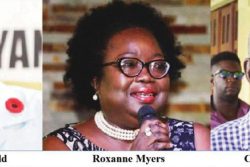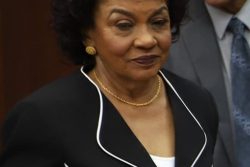(Trinidad Express) Trinidad and Tobago did absolutely nothing wrong in the matter involving the deportation of 13 Jamaican nationals from this country last week, Prime Minister Kamla Persad-Bissessar said.
This according to the official report from this country’s Immigration Division that was presented to her through National Security Minister Gary Griffith, Persad-Bissessar said on Tuesday.
“Until any further evidence comes forward based on that report it appears we are in compliance with the law,” Persad-Bissessar said on Tuesday.
Persad-Bissessar has, however, advised Foreign Affairs Minister Winston Dookeran to travel to Jamaica in order to have discussions with his “counterparts” there to address the issue.
She has also signalled her intention to hold discussions with Trade Minis-ter Vasant Bharath over the threat of a boycott of Trinidad and Tobago products in Jamaica in response to the matter.
Persad-Bissessar made the statements following the official hand-over ceremony of the Arima Police Station on Tuesday.
“I have advised Minister Dookeran to accept the invitation, a letter came (yesterday) of invitation from Jamaica to Minister Dookeran and I have asked him to accept that invitation to speak with his counterparts there,” Persad-Bissessar said yesterday.
The invitation to Dookeran from Jamaica came in the wake of 13 Jamaican nationals being deported after being denied entry into this country last week.
The 13 Jamaicans were not allowed to leave the Piarco International Air-port after landing there last week Tuesday.
Reports from Jamaica state Trinidad and Toba-go’s Immigration Division refused their nationals entry into this country in breach of the Revised Treaty of Chaguaramas which allows for free movement of Caribbean Community (Caricom) nationals among Caricom Member States.
Persad-Bissessar yesterday referenced the recent ruling by the Caribbean Court of Justice (CCJ) in the Shanique Myrie case to highlight this county’s adherence to all rules.
Myrie had filed a lawsuit against the Barbados government, claiming that on March 14, 2011, she was made to undergo a painful and humiliating body cavity search by a Barbadian border official upon her arrival at the Sir Grantley Adams Inter-national Airport from Jamaica.
On October 4, the CCJ awarded Myrie, 25, was a total of Bds$77,240 (TT$232,000) of the Bds$1 million (TT$3.2 million) she had initially sought.
She was awarded costs for the money spent on having an attorney represent her in the case.
Persad-Bissessar said following the CCJ’s ruling in the Myrie matter Caricom issued some guidelines to all the governments of Members States but there are discretions that can be exercised by Immigration officials.
“There are exceptions in terms of when you can refuse entry. Basically, there are several areas which can allow you the authority or the jurisdiction not to grant admission,” Persad-Bissessar said.
Persad-Bissessar said two of these are if the person is blacklisted or if they will be a “charge” on this country’s economy.
“The (immigration) officer then has discretion if this person is coming here to become a charge on the public purse, in other words does he have somewhere to stay, does he have sufficient money for the length of his visit,” Persad-Bissessar said.
“There is no blanket acceptance but there is also, I am being advised, a procedure if you are to refuse entry, there is a suggested procedure that should be followed. So we will be looking into all of that with the view of course of upholding the law as pronounced upon by the Caribbean Court of Justice,” she said.




